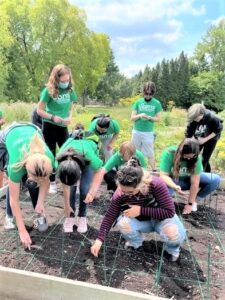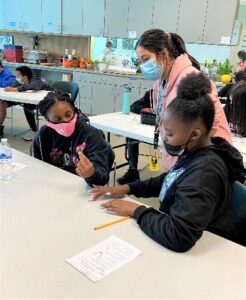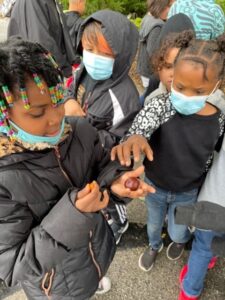Plant Hope and Planet Hope are FBBG created & fully funded programs, offered for public schools that demonstrate the need for financial support to participate in these programs.
Information & Scheduling: FBBG Education Manager Judi Dee, 414-525-5659 or jdee@fbbg.org
Plant Hope….Introduced in 2005
Plant Hope Program is a four-session program held at the Boerner Botanical Gardens and offered over the course of the school year to promote a deeper understanding of plant science basics which serve a vital role in both scientific and lifelong learning, while building student self-esteem through interaction with the natural world. Grades 3-6.
- Seed Dispersal – Students learn methods of seed dispersal while inside our classroom. Students are then lead on a guided walk to interact with plants and see first-hand the fascinating way many plants disperse their seeds. September through November
- Plant Dormancy and Food Storage – Students focus on the adaptations of plants that allow them to survive over winter. In the classroom students explore roots and the movement of water and food through the stem. A guided walk outside follows for students to discover plants in various stages of dormancy. December through February
- Soil and Vermiculture – Students will learn about the mineral and organic components of soil, including the importance of decomposers. Students explore worms and fungi and the vital role they play in decomposition. Each class will make a worm composting bin to take back to school with them, to create compost at school and return it to the gardens to make our plants grow. Following the classroom portion, the class will tour the adjacent woods to see natural decomposers. February through March
- Garden Safari – Students learn how seasonal changes affect plants, and the explore the anatomy of flowers. Tour the gardens to touch, smell, and taste some of the plants. Students will put their learning to work as they plant in the FBBG student gardens. April through June
Planet Hope…Introduced in 2011
Planet Hope is a four-session program designed to meet the needs of middle school and high school students. These classes include indoor class learning and outdoor application of skills.
Topics to choose from include:
- Water Works – Students will explore and conduct simple experiments at Boerner’s ponds, bog, and our rainwater reclamation area to learn how water is vital to the survival of all living things.
- Wild about Wisconsin – Discover the important role plants played in the history of our state.
- Plant Propagation – Compare and experiment with different methods for propagating plants that we use at the garden, including through seeds and stem cuttings. Learn about sexual and asexual reproduction in plants.
- An Up-Close Look at Soil – Students will understand the concepts of soil erosion and conservation. Students will test their knowledge of soil and learn about creatures found in the soil that benefit a garden.
- Trees and Forestry – Students learn about Wisconsin forests and the trees that thrive in them. Discover the many uses of trees, learn to identify trees by leaf, bark, height, and overall shape. Experiment with forestry techniques for quickly measuring tree height and diameter.
- Vermicomposting – Red wiggler worms are responsible for a lot of the things that help make our soil good enough to grow healthy plants. Join us as we learn why worms are so important for the environment.
- Garden Innovations – Students discover the value of small space garden techniques as they complete a hands-on measuring mission in the Garden using formulas to calculate perimeter, area, and volume.
- Spring Garden Walk and Planting – Students will tour the botanical gardens, learning about the varied plant life and specimens growing there, and then spend time working in the garden.









